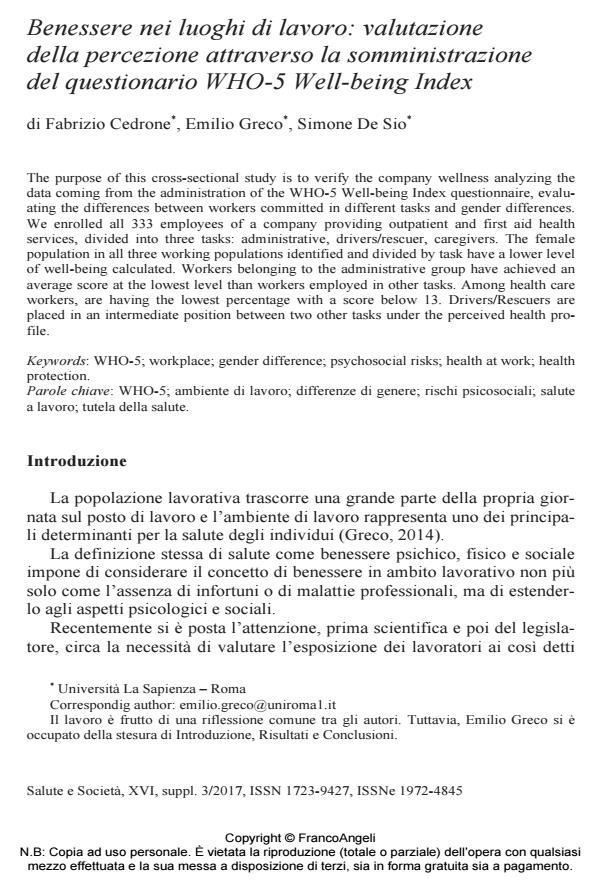Benessere nei luoghi di lavoro: valutazione della percezione attraverso la somministrazione del questionario WHO-5 Well-being Index
Titolo Rivista SALUTE E SOCIETÀ
Autori/Curatori Fabrizio Cedrone, Emilio Greco, Simone De Sio
Anno di pubblicazione 2017 Fascicolo 2017/3-Suppl.
Lingua Italiano Numero pagine 12 P. 136-147 Dimensione file 78 KB
DOI 10.3280/SES2017-SU3009
Il DOI è il codice a barre della proprietà intellettuale: per saperne di più
clicca qui
Qui sotto puoi vedere in anteprima la prima pagina di questo articolo.
Se questo articolo ti interessa, lo puoi acquistare (e scaricare in formato pdf) seguendo le facili indicazioni per acquistare il download credit. Acquista Download Credits per scaricare questo Articolo in formato PDF

FrancoAngeli è membro della Publishers International Linking Association, Inc (PILA), associazione indipendente e non profit per facilitare (attraverso i servizi tecnologici implementati da CrossRef.org) l’accesso degli studiosi ai contenuti digitali nelle pubblicazioni professionali e scientifiche.
The purpose of this cross-sectional study is to verify the company wellness analyzing the data coming from the administration of the WHO-5 Well-being Index questionnaire, evaluating the differences between workers committed in different tasks and gender differences. We enrolled all 333 employees of a company providing outpatient and first aid health services, divided into three tasks: administrative, drivers/rescuer, caregivers. The female population in all three working populations identified and divided by task have a lower level of well-being calculated. Workers belonging to the administrative group have achieved an average score at the lowest level than workers employed in other tasks. Among health care workers, are having the lowest percentage with a score below 13. Drivers/Rescuers are placed in an intermediate position between two other tasks under the perceived health profile.
Parole chiave:WHO-5; ambiente di lavoro; differenze di genere; rischi psicosociali; salute a lavoro; tutela della salute.
- Feeling supported and engaged during COVID-19: the role of family and colleagues in promoting teachers’ well-being Annalisa Soncini, Francesca Floris, Maria Cristina Matteucci, in Teachers and Teaching /2023 pp.37
DOI: 10.1080/13540602.2022.2144820 - Consequences of COVID19-pandemic lockdown on Italian occupational physicians’ psychosocial health Simone De Sio, Giuseppe La Torre, Giuseppe Buomprisco, Ekaterina Lapteva, Roberto Perri, Paola Corbosiero, Pietro Ferraro, Arianna Giovannetti, Emilio Greco, Fabrizio Cedrone, Marianna Mazza, in PLOS ONE /2021 pp.e0243194
DOI: 10.1371/journal.pone.0243194 - A new tool to evaluate burnout: the Italian version of the BAT for Italian healthcare workers Ivan Borrelli, Paolo Emilio Santoro, Caterina Fiorilli, Giacomo Angelini, Ilaria Buonomo, Paula Benevene, Luciano Romano, Maria Rosaria Gualano, Carlotta Amantea, Umberto Moscato, in BMC Public Health 474/2022
DOI: 10.1186/s12889-022-12881-y - An Italian Adaptation of the Burnout Assessment Tool-Core Symptoms (BAT-C) for Students Luciano Romano, Giacomo Angelini, Piermarco Consiglio, Caterina Fiorilli, in Education Sciences /2022 pp.124
DOI: 10.3390/educsci12020124 - The Burnout Assessment Tool (BAT): A Contribution to Italian Validation with Teachers’ Giacomo Angelini, Ilaria Buonomo, Paula Benevene, Piermarco Consiglio, Luciano Romano, Caterina Fiorilli, in Sustainability /2021 pp.9065
DOI: 10.3390/su13169065
Fabrizio Cedrone, Emilio Greco, Simone De Sio, Benessere nei luoghi di lavoro: valutazione della percezione attraverso la somministrazione del questionario WHO-5 Well-being Index in "SALUTE E SOCIETÀ" 3-Suppl./2017, pp 136-147, DOI: 10.3280/SES2017-SU3009